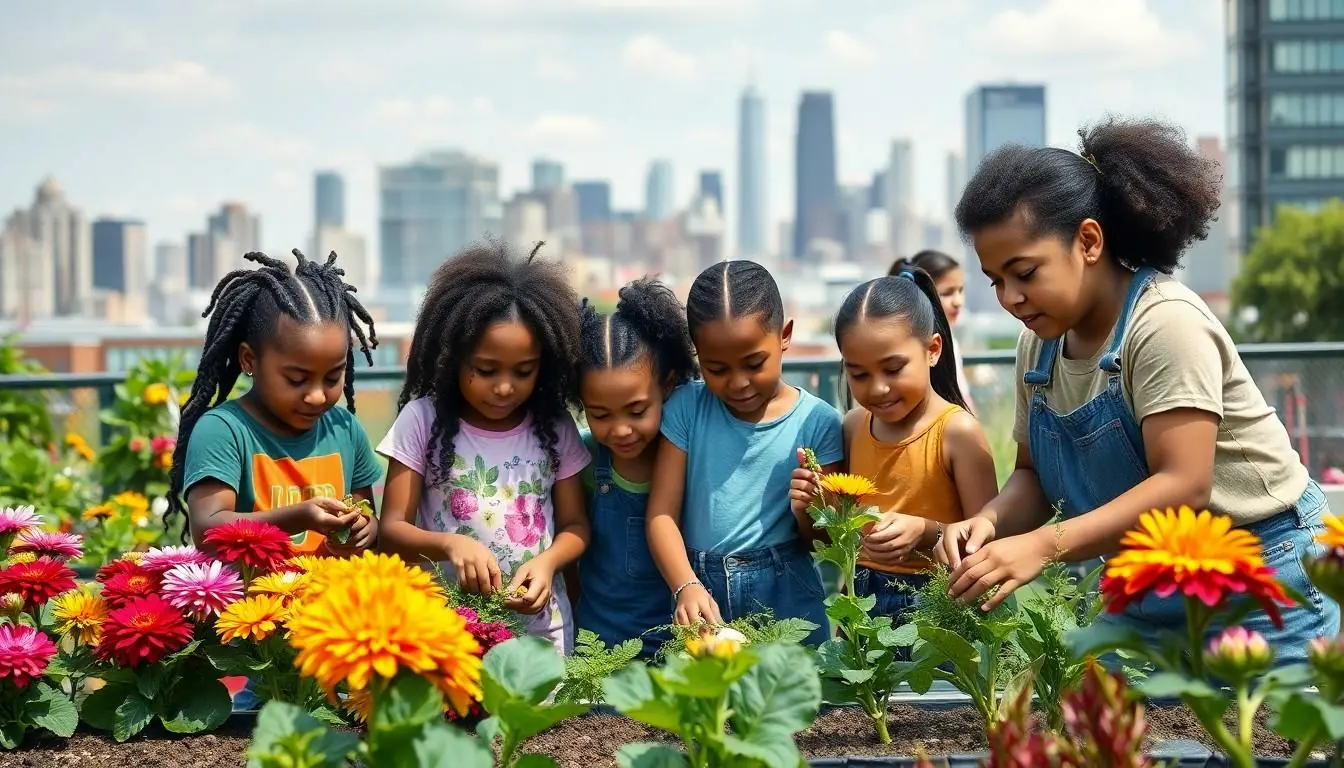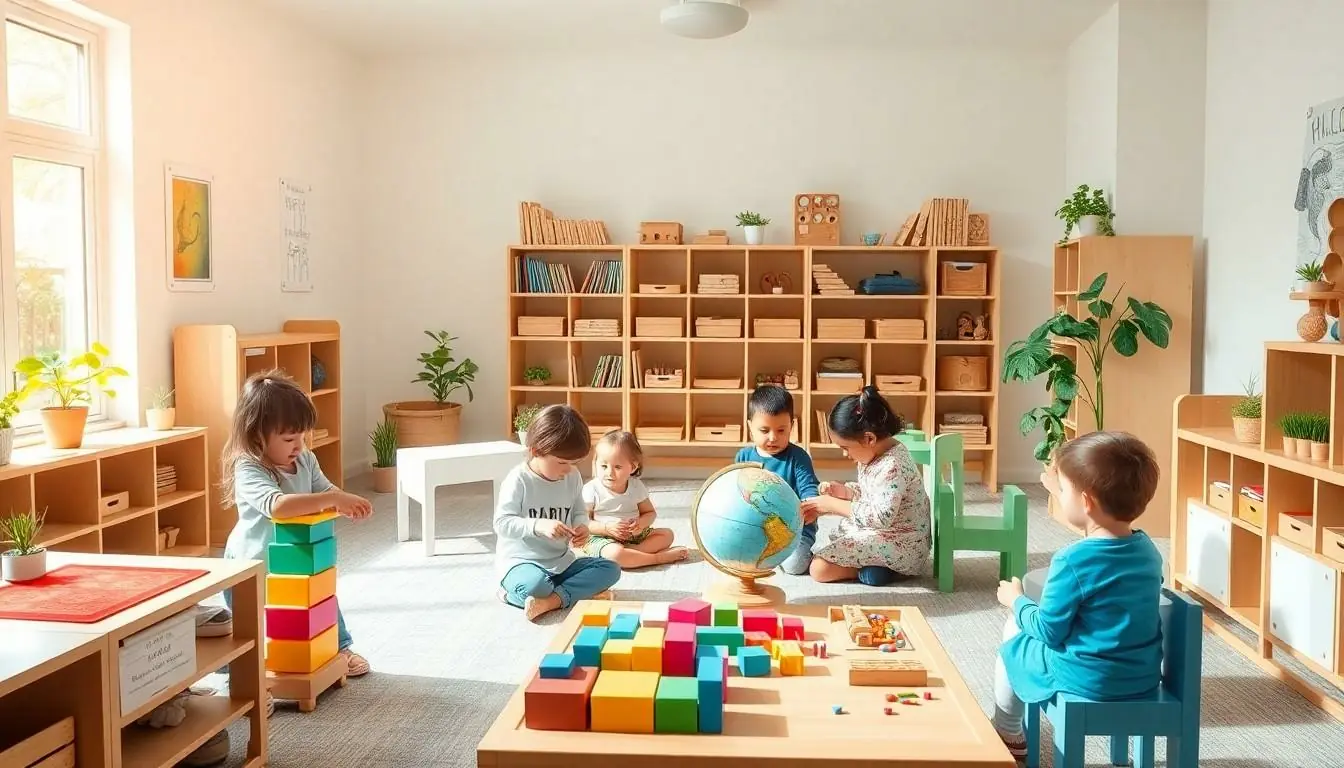Looking for an educational approach that turns little ones into confident, independent learners? Montessori in Town brings the renowned Montessori method right to your neighborhood, making quality education accessible for families who want the best for their children.
This innovative learning center combines traditional Montessori principles with modern urban convenience. Parents don’t need to drive miles out of their way or relocate to give their children the benefits of a Montessori education. Instead, they’ll find a warm, nurturing environment that fosters curiosity and self-directed learning right in the heart of the community.
Table of Contents
ToggleWhat Is Montessori Education?
Montessori education empowers children to develop natural interests through hands-on learning experiences in prepared environments. This educational approach combines structured activities with independent exploration to foster holistic development.
Core Principles and Philosophy
Montessori education centers on five fundamental principles that guide child development. Mixed-age classrooms enable younger students to learn from older peers while older students reinforce their knowledge through teaching. Children engage with specially designed materials at their own pace, choosing activities that match their interests. Teachers observe each child’s progress closely, offering guidance when needed rather than directing every activity. The environment promotes independence through child-sized furniture, accessible materials on low shelves, and practical life activities like food preparation or plant care. Freedom within limits allows children to move freely, select work, and interact socially while respecting clear behavioral boundaries.
The Urban Montessori Environment
Urban Montessori classrooms adapt traditional elements to modern city settings without compromising educational quality. Natural light flows through large windows, creating bright spaces that connect children to the outside world. Indoor gardens bring nature into the classroom, teaching sustainability in concrete ways. Storage solutions maximize limited space while maintaining the orderly environment essential to Montessori learning. Community connections enhance the curriculum through walking trips to local parks, libraries or markets. The urban setting provides rich opportunities for cultural experiences through proximity to museums, theaters or diverse neighborhood activities. Sound-dampening materials create peaceful workspaces despite city noise, ensuring focused learning environments.
Benefits of Urban Montessori Schools
Urban Montessori schools combine traditional Montessori principles with the advantages of city living. These educational centers create dynamic learning environments that leverage metropolitan resources to enhance children’s development.
Access to Cultural Resources
Urban Montessori schools provide direct access to museums, theaters, libraries art galleries. Students participate in regular field trips to cultural institutions, expanding their understanding through hands-on experiences. Local artists visit classrooms to conduct workshops while cultural organizations offer specialized programs tailored for Montessori learners. The proximity to diverse cultural venues enables teachers to integrate real-world learning experiences into daily lessons. Children explore science at interactive museums, practice language skills at international cultural centers engage with performing arts at local theaters.
Community Integration Opportunities
Urban Montessori students connect with local businesses, organizations neighborhood initiatives through service projects. Children visit farmers markets to learn about nutrition practice practical life skills through community gardening programs. Local professionals share career insights during classroom presentations fostering early awareness of diverse vocational paths. Students participate in neighborhood cleanup events environmental conservation projects developing civic responsibility. The urban setting creates natural opportunities for multilingual development as children interact with diverse community members in authentic settings.
Key Features of City-Based Montessori Programs
City-based Montessori programs integrate essential Montessori principles with urban adaptations. These programs maintain core educational elements while maximizing the advantages of metropolitan locations.
Mixed-Age Classrooms
Urban Montessori classrooms group children in three-year age spans from 3-6 6-9 or 9-12 years. Older students become natural mentors teaching younger peers through daily interactions. Children rotate between roles as learners leaders creating a dynamic social environment. This structure enables 8 learning opportunities daily through peer teaching observation direct instruction. Multi-age groupings promote language development social skills emotional growth among diverse urban populations. Students progress at their own pace without grade-level restrictions moving freely between skill levels. The classroom community mirrors real-world social structures found in city environments.
Prepared Learning Spaces
Urban Montessori environments feature specialized learning zones optimized for city settings. Natural light flows through large windows into defined areas for practical life sensorial academic work. Child-sized furniture materials stay accessible on open shelves at appropriate heights. Learning spaces incorporate elements from the surrounding city with maps local architecture cultural artifacts. Mobile room dividers create flexible spaces adapting to various group sizes activities. Indoor gardens growing stations connect children to nature despite the urban location. Sound-dampening materials minimize city noise ensuring focused work periods. The carefully curated environment supports independence concentration skill development through hands-on exploration.
Choosing a Montessori School in Your City
Selecting a Montessori school requires careful evaluation of specific criteria that impact educational quality and family convenience. The following factors help parents make informed decisions about urban Montessori options.
Location and Accessibility
Urban Montessori schools’ locations affect daily routines and learning opportunities. Schools near public transportation hubs offer convenient access for families without cars. A centralized location enables quick drop-offs and pickups, reducing commute times to 15-20 minutes. Proximity to cultural institutions like libraries museums enriches educational experiences through regular field trips. Safe walking routes with proper sidewalks crosswalks allow children to develop independence through supervised neighborhood exploration.
Program Quality Indicators
Quality Montessori programs display specific characteristics that validate their educational approach. Certified Montessori teachers hold credentials from recognized organizations such as AMI or AMS. Classrooms maintain proper student-teacher ratios: 1:10 for ages 3-6 1:12 for ages 6-9. Essential components include:
- Complete sets of Montessori materials organized by subject areas
- Mixed-age groupings spanning 3-year periods
- Three-hour uninterrupted work cycles each morning
- Documentation systems tracking individual student progress
- Parent education programs offering monthly workshops
- Accreditation from recognized Montessori organizations
| Age Group | Maximum Students | Teacher Ratio |
|---|---|---|
| Ages 3-6 | 20-24 | 1:10 |
| Ages 6-9 | 24-30 | 1:12 |
| Ages 9-12 | 25-30 | 1:15 |
Supporting Your Child’s Montessori Journey
Parents play a vital role in extending Montessori principles beyond the classroom. Creating harmony between school and home environments strengthens a child’s educational experience in urban settings.
Home-School Connection
Montessori principles integrate seamlessly into urban home environments through practical adjustments. Low shelves with organized materials enable children to access and return items independently. Child-sized cleaning tools encourage participation in household tasks. A dedicated workspace with minimal distractions supports concentrated activity periods. Parents maintain consistent routines between home and school by using clear language, allowing appropriate choice-making, and respecting work cycles. Regular communication with teachers through digital platforms keeps parents informed about classroom activities enabling them to reinforce concepts at home.
Urban Enrichment Activities
Urban environments offer abundant opportunities to extend Montessori learning through real-world experiences. Children practice practical life skills at farmers markets, grocery stores, and community gardens. Cultural institutions provide hands-on learning experiences:
| Institution Type | Learning Opportunities |
|---|---|
| Museums | Art appreciation, scientific exploration |
| Libraries | Language development, research skills |
| Theaters | Creative expression, cultural awareness |
| Parks | Nature observation, physical development |
- Observing bakers prepare bread
- Counting currency at market stands
- Sorting recycling at community centers
- Tending community garden plots
Conclusion
Montessori in Town represents a perfect blend of traditional Montessori education and urban living advantages. The thoughtful adaptation of Montessori principles to city settings creates an enriching educational experience that benefits both children and families.
These urban programs demonstrate how quality education can thrive in metropolitan areas while maintaining the core values of independence self-directed learning and community engagement. Parents who choose urban Montessori schools give their children the gift of exceptional education paired with the cultural richness of city life.
The success of Montessori in Town proves that location should never limit access to outstanding educational opportunities. Through careful planning and adaptation children can flourish in urban Montessori environments that prepare them for lifelong learning and success.




